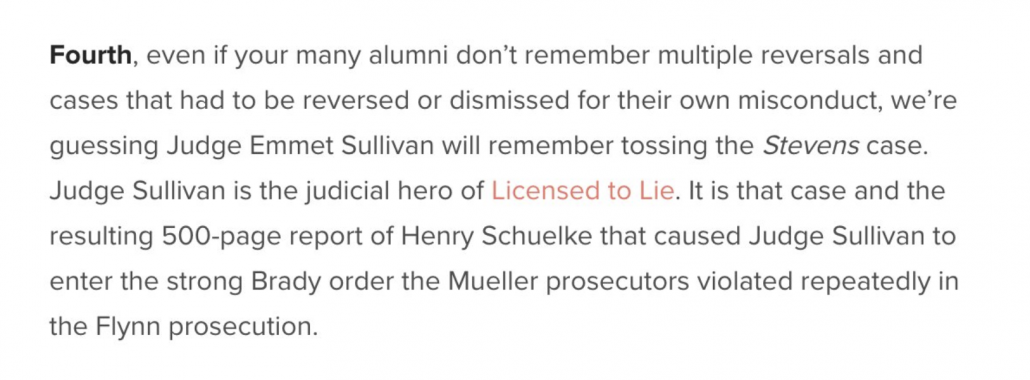Sidney Powell Argues that Judge Sullivan Can’t Appoint an Amicus at Same Time as Applauding the Time He Did Far More
As noted, on Monday, a group of former Watergate prosecutors moved for permission to submit an amicus brief in the Mike Flynn case, noting that DC Circuit precedent permits a judge to appoint an amicus where there are questions about the facts cited to justify overturning a guilty verdict after acceptance. In response, Judge Emmet Sullivan issued an order basically saying there’d be time for amici to weigh in, but not yet.
In response, Flynn’s lawyers argue that Sullivan can’t accept that amicus brief. They says that because amici are allowed on the civil side they are expressly not permitted on the criminal side.
Under the canon of statutory construction expressio unius est exclusio alterius, the express mention of amicus briefs on the civil side must be understood to exclude them on the criminal side. See Adirondack Med. Ctr. v. Sebelius, 740 F.3d 692, 697 (D.C. Cir. 2014) (“the canon’s relevance and applicability must be assessed within the context of the entire statutory framework” (emphasis added), rather than in isolation or out of context).
They complain that Flynn’s prosecution has already taken three years.
Moreover, this travesty of justice has already consumed three or more years of an innocent man’s life—and that of his entire family. No further delay should be tolerated or any further expense caused to him and his defense. This Court should enter the order proposed by the government immediately.
Remember: Mueller’s prosecutors obliged Flynn’s request that he move to sentencing quickly in December 2018. Since that time, however, Flynn’s requests account for about 500 of the 512 days since, including the entire period since January 20 so Bill Barr could set up his bureaucratic pardon for Flynn.
But Flynn’s lawyers do make one non-hilarious argument. They note that at the beginning of his involvement in Flynn’s case, Judge Sullivan said that the rules of criminal procedure don’t permit intervention by third parties.
As set out in Exhibit A, this Court, on twenty-four specific occasions has rejected all prior attempts of other parties who have claimed an interest to intervene in this case in any way—as it should have. Exhibit A. Its December 20, 2017, Minute Order stands out. There this Court wrote:
MINUTE ORDER. This Court has received several motions to intervene/file an amicus brief along with letters in support from a private individual who is neither a party to this case nor counsel of record for any party. The Federal Rules of Criminal Procedure do not provide for intervention by third parties in criminal cases. The Court recognizes that the movant sincerely believes that he has information to share that bears on this case, and that, understandably, he wishes to be heard. Options exist for a private citizen to express his views about matters of public interest, but the Court’s docket is not an available option. The docket is the record of official proceedings related to criminal charges brought by the United States against an individual who has pled guilty to a criminal offense. For the benefit of the parties in this case and the public, the docket must be maintained in an orderly fashion and in accordance with court rules. The movant states that he disagrees with the similar Minute Order issued by Judge Berman Jackson in Criminal Case Number 17-201, but the contrary legal authority on which he relies is neither persuasive nor applicable. Therefore, the Clerk is directed not to docket additional filings submitted by the would-be intervenor. If the individual seeks relief from this Court’s rulings, he must appeal the rulings to the United States Court of Appeals for the District of Columbia Circuit. Signed by Judge Emmet G. Sullivan on 12/20/2017. (lcegs3) (Entered: 12/20/2017).
They quote him disagreeing with Judge Amy Berman Jackson’s treatment of amici, which is important, given that he cited her willingness to let Mike Cernovich intervene in Roger Stone’s challenge to his jury in his order regarding amici yesterday. They also include a list of requests by amici to intervene, which Sullivan refused.
Meanwhile, at almost the same time that this was posted, Sidney Powell posted a screed attacking Barack Obama’s comments on her client, which she has since deleted (Update: she has reposted it with some changes). She accused Obama of erring when he said Flynn had committed perjury (Flynn has given multiple sworn statements that materially conflict, but he has not been charged for them; he was charged with false statements). She may be right on the technicality, but it’s an odd thing to complain about since the key reason she has offered for challenging Flynn’s guilty plea is that he was caught in a “perjury” trap.
More interesting still, considering her response to the Watergate prosecutor motion, is this claim.
On the same day Sidney Powell reminded Sullivan that he has denied amicus after amicus, she also applauded Sullivan for appointing Henry Schuelke to investigate the circumstances of the Ted Stevens prosecution. As she notes, the resulting report led Sullivan to adopt a policy whereby any defendant in his court, even one pleading guilty, gets access to Brady material.
What she doesn’t note is that Emmet Sullivan already ruled in this case that the stuff Flynn was asking for was not Brady material, and thus far there’s no reason to believe the exhibits accompanying DOJ’s latest motion — one of which reflected facts known to Flynn when he pled guilty a second time, and the other of which was deliberative — are Brady (and DOJ did not make that claim, either).
Still, on the day she filed a motion telling Emmet Sullivan he has no authority to approve of amici, she posted something (then deleted it) making it clear she believes Sullivan can go much further and appoint an outside investigator to investigate irregularities in a prosecution.
Deleting the post isn’t going to help her, though. She’s already hailed that prior instance when Sullivan appointed outside investigators when faced with prosecutors who had failed to heed the authority of his court, in this docket.
This “heads we win, tails we win” perspective infected and corrupted the prosecution of United States Senator Ted Stevens, four Merrill Lynch executives, and untold others across the country. See, e.g., Report to Hon. Emmet G. Sullivan of Investigation Conducted Pursuant to the Court’s Order dated April 7, 2009 (“Schuelke Report”), In re Special Proceedings, No. 09-mc00198-EGS, (D.D.C. Nov. 14, 2011);
[snip]
It is well documented that systematic, intentional misconduct has been pervasive in the Department of Justice. See Schuelke Report
[snip]
13 “DOJ assigned a new team of prosecutors after District Judge Emmet G. Sullivan held William Welch, the Chief of the Public Integrity Section, Brenda Morris, his Principal Deputy Chief, and another senior DOJ attorney, in contempt on February 13, 2009, for failing to comply with the Court’s order to provide certain information to Senator Stevens’s attorneys, Williams & Connolly, and to the Court regarding a complaint filed by FBI Agent Chad Joy in December 2008 which “raised serious allegations of prosecutorial and governmental misconduct in the investigation and trial of Senator Stevens.” Stevens, Mem. Op., Oct. 12, 2010, at 2 (Dkt. No. 421); see also id., Mem. Op. & Order, Dec. 19, 2008 (Dkt. No. 255); id., Order, Dec. 22, 2008 (Dkt. No. 256); id., Order, Jan. 14, 2009 (Dkt. No. 261); id., Op. & Order, Jan. 21, 2009 (Dkt. No. 274); Schuelke Report at 32.
The issue here is different: prosecutors before his court — the political appointee, Timothy Shea, by himself — has moved to overturn several decisions Sullivan has already entered, making unsubstantiated claims about “new” information.
But Powell bought off on the principle way back in August. So deleting a post that materially conflicts what she is telling Sullivan as an officer of the court will not change that she has already said the same thing, directly to him, as an officer of the court.



